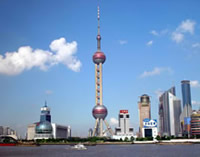|
|


ADVERTISEMENT
Buy Your own advertising
spaces!
.
Download Adobe Acrobat Reader to open [PDF] files.
Recent Visitors
China plans yet another ecocity but can it deliver?
2009. 7 May
(ciobinternational.org) An unnamed Malaysian client has commissioned architect Ken Yeang to masterplan a 4,000-acre sustainable city in the sea off Shanghai.
The project will be situated on reclaimed tidal flats and will feature offices, housing, theme parks, visitor attractions and hotels, according to UK's Building magazine.
TR Hamzah and Yeang, the Malaysian sister company of Llewelyn Davies Yeang, is leading the design of the 'Shanghai Beach' masterplan.
Web Structures, a Singaporean engineer, is carrying out a feasibility study. Hossein Rezai-Jorabi, its group director, told Building: "The opportunity to reclaim almost 4,000 acres without damaging the eco-structure of the ocean is a challenge. If it’s feasible, and we believe it is, the plan is to create world-class architecture to revitalise the district as a tourist destination."
Building argues this shows China has not ditched its green ambitions but other commentators doubt China’s ability to follow through with these expensive eco-projects. For instance, in 2005 Dongtan was billed as the world's first 'eco-city' project, transforming a marshy island off Shanghai into an advanced and sustainable community eventually housing 500,000 people. The first phase was to be finished in time for the 2010 Shanghai Expo but to date no significant work has been carried out.
Environment journalist Christina Larson, in a recent article on the website www.peopleandplanet.net, cautioned: "Dongtan and other highly touted eco-cities across China were meant to be models of sustainable design for the future. Instead, they’ve become models of bold visions that mostly stayed on the drawing boards, or collapsed from shoddy implementation.
"More often than not, these vaunted eco-cities have been designed by big-name foreign architectural and engineering firms who plunged into the projects with little understanding of Chinese politics, culture, and economics and with little feel for the needs of local residents whom the utopian communities were designed to serve."
Source: wwww.ciobinternational.org

